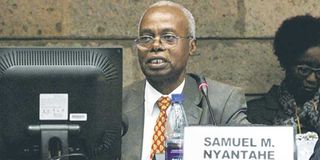Skills development levy hits employers

Confederation of Tanzania Industries chairman Samuel Nyantahe speaks at a past event. PHOTO|FILE
What you need to know:
The call was made in a document titled ‘CTI Matrix Proposals for the Task Force on Tax Reform for the 2018/19 Financial Year.’
Dar es Salaam. The Confederation of Tanzania Industries (CTI) has proposed reduction of the Skills Development Levy (SDL) from the current 4.5 per cent to 3.5 per cent.
The call was made in a document titled ‘CTI Matrix Proposals for the Task Force on Tax Reform for the 2018/19 Financial Year.’
This comes at a time when the Parliament is almost in the middle of what has come to be known as the national budget session for the 2018/19 financial year that starts next July 1.
The Vocational Education and Training Levy Act (2001), makes it mandatory for private employers to pay SDL.
Concerted efforts by CTI have been focused at seeing to the levy being gradually reduced to two per cent in due course of time.
Created 27 years ago, CTI is a membership business association which advocates the creation of an optimal business environment in Tanzania.
Among other things, the Confederation strives to lessen the cost of doing business – with all the attendant benefits that include increased investments, jobs creation, and all-inclusive socio-economic development.
A high SDL increases the cost of doing business for domestic manufacturers compared to manufacturers beyond Tanzania’s borders.
Four member countries of the East African Community (EAC) –Uganda, Rwanda, Burundi and South Sudan – do not charge skills development levies. Another member, Kenya, charges two per cent – which applies only to the tourism sector.
“The current rate (4.5 per cent) in Tanzania contributes to the lower overall competitiveness in the skills delivery system in the region and the world,” reads the CTI document in part.
“In the event, it reduces business profits – and, hence, tax revenues for the government.”
The CTI acting director for policy and advocacy, Akida Mnyenyelwa, said a level playing field is of paramount importance in seeking to increase economic productivity and, as a consequence, government revenues.
“Reducing the SDL means reducing the tax burden on employers, promoting competitiveness of domestic industries and increasing jobs creation,” reads the CTI document, a copy of which has been availed to BusinessWeek.
According to international practice, one to two per cent payroll levy is the ideal.
This rate would no doubt enhance compliance... And, “with increased compliance, the measure coul generate more government revenue in the long run,” CTI says.
For many years the Association of Tanzania Employers (Ate) has also been dancing to the same tune, pushing for the government to slash the SDL to two per cent.
In 2016, the government agreed to a reduction of the levy from 5 per cent to the current 4.5 per cent.




